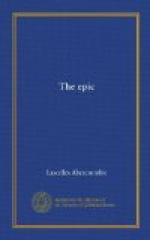own notions, the material he received from his teachers;
the prowess of the great heroes would become more and
more astonishing, more and more calculated to keep
awake the feasted nobles who listened to the song.
In an age when writing, if it exists at all, is a
rare and secret art, the mists of antiquity descend
after a very few generations. There is little
chance of the songs of the bards being checked by
recorded actuality; for if anyone could write at all,
it would be the bards themselves, who would use the
mystery or purposes of their own trade. In quite
a short time, oral tradition, in keeping of the bards,
whose business is to purvey wonders, makes the champions
perform easily, deeds which “the men of the present
time” can only gape at; and every bard takes
over the stock of tradition, not from original sources,
but from the mingled fantasy and memory of the bard
who came just before him. So that when this tradition
survives at all, it survives in a form very different
from what it was in the beginning. But apparently
we can mark out several stages in the fortunes of the
tradition. It is first of all court poetry, or
perhaps baronial poetry; and it may survive as that.
From this stage it may pass into possession of the
common people, or at least into the possession of bards
whose clients are peasants and not nobles; from being
court poetry it becomes the poetry of cottages and
taverns. It may survive as this. Finally,
it may be taken up again by the courts, and become
poetry of much greater sophistication and nicety than
it was in either of the preceding stages. But
each stage leaves its sign on the tradition.
All this gives us what is conveniently called “epic
material”; the material out of which epic poetry
might be made. But it does not give us epic poetry.
The world knows of a vast stock of epic material scattered
up and down the nations; sometimes its artistic value
is as extraordinary as its archaeological interest,
but not always. Instances are our own Border
Ballads and Robin Hood Ballads; the Servian cycles
of the Battle of Kossovo and the prowess of Marko;
the modern Greek songs of the revolt against Turkey
(the conditions of which seem to have been similar
to those which surrounded the growth of our riding
ballads); the fragments of Finnish legend which were
pieced together into the Kalevala; the Ossianic
poetry; and perhaps some of the minor sagas should
be put in here. Then there are the glorious Welsh
stories of Arthur, Tristram, and the rest, and the
not less glorious Irish stories of Deirdre and Cuchulain;
both of these noble masses of legend seem to have
only just missed the final shaping which turns epic
material into epic poetry. For epic material,
it must be repeated, is not the same thing as epic
poetry. Epic material is fragmentary, scattered,
loosely related, sometimes contradictory, each piece
of comparatively small size, with no intention beyond
hearty narrative. It is a heap of excellent stones,




